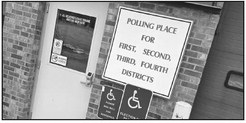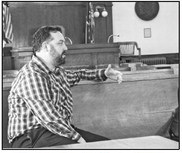America is a democracy and a republic
Vox Pop
After reading the letters to the letters to the editor I found some interesting questions were raised. 1) Is the U.S. a democracy or a republic? And 2) Abolishing the electoral college or voting directly?
Regarding No. 1 As Eugene Volokh, a constitutional scholar and professor at the UCLA school of law writes - the answer to number one is the U.S. is both a republic and a democracy. “John Adams used the term “representative democracy” in 1794; so did Noah Webster in 1785; Thomas Jefferson in 1815.”
“James Wilson, one of the main drafters of the Constitution and one of the first Supreme Court justices, defended the Constitution in 1787 by speaking of three forms of government being the “monarchical, artistocratical, and democratical,” and said that in a democracy the sovereign power is “inherent in the people, and is either exercised by themselves or by their representatives.”
“…when people in the framing era were discussing popular government as opposed to government in which the bulk of the people had no voice, they often used “democracy” (or “democratic or democratical”) to mean “not monarchy or despotism or aristocratical” with the “demo-“ referring to popular control (what would become Lincoln’s “government of the people, for the people and by the people”). But when they were discussing government as opposed to direct government, they often used “democracy” or “pure democracy” to mean “not representative government,” with the “demo” referring to popular decision making.
The same is so today, America is a democracy, in that it is not a monarchy or a dictatorship.”
As for No. 2 abolishing the Electoral College and voting directly. Many believe abolishing the electoral college allows for every vote cast to be counted to elect a president. From NPR: “Under the current system, voters in each state cast their ballots for electors, of which 270 are necessary to win. So it’s possible for a candidate to win more votes overall across the country than a rival but not be inaugurated because of insufficient support from the Electoral College: a scenario that has occurred twice in the past two decades.”
The problem is that abolishing the Electoral College won’t happen any time soon. “Fully overhauling the way the president is selected would take a Constitutional amendment, which would require the votes of two-thirds of the U.S. House of Representatives, two-thirds of the Senate, and three-fourths of the states.” Amendments have been made to the electoral college system but it takes a while to get them through Congress – in 1972 the 26th amendment went through the fastest – in 100 days, the 27th amendment was adopted in 1992.
It may be that the longing to keep the Electoral College is to keep things the way they have always been. In the past three and a half years there has been so much upheaval and division promulgated by the current president and the GOP I believe there is a longing to not change things.
Yet, I am reminded of a partial quote by Ernest Hemingway “The world breaks everyone and afterward many are strong at the broken places.
— Sue Roupp, Rib Lake




